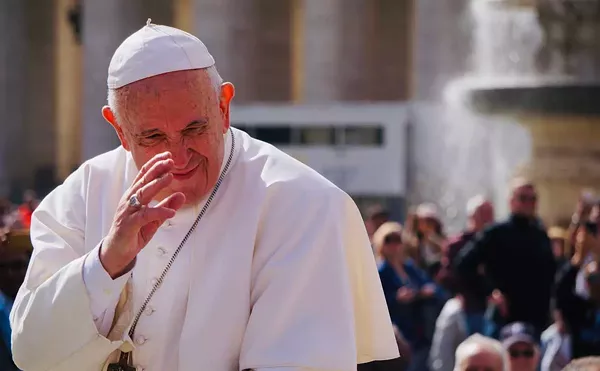
Audio By Carbonatix
[
{
"name": "GPT - Leaderboard - Inline - Content",
"component": "35519556",
"insertPoint": "5th",
"startingPoint": "3",
"requiredCountToDisplay": "3",
"maxInsertions": 100,
"adList": [
{
"adPreset": "LeaderboardInline"
}
]
}
]
We only get a few brief moments of Tilda Swinton's Ice Witch in this latest chapter of the Narnia chronicles but, oh, how she's missed. It's not that the first installment — The Lion, The Witch and the Wardrobe — was all that great, for the most part the movie was a leaden bore with one of the worst film scores in recent memory. It's that Swinton brought genuine menace to her role, creating a villain worth fearing. You really got the sense that the sweeter-than-sweet Pevensie moppets were in deep doo-doo whenever she showed up.
Of course, the rest of the film was essentially adorable kids acquiring unearned glory with the aid of talking animals. Need a sword? Poof! Here comes Santa Claus with the armaments. Fatally wounded in battle? Poof! You're healed.
Prince Caspian isn't much better. Handsomely mounted but utterly soulless, it relies on an arch-nemesis that falls somewhere between Inigo Montaya ("you keeled my father, prepare to die!") and King Leonidas in 300. The evil Miraz (Sergio Castellitto) shouts and scowls and looks dastardly enough but generates few worries.
And much like director Andrew Adamson's first stab at the series, the film's everything-but-the-kitchen-sink fantasy and awkward Christian overtones get in the way of competent storytelling. Amid the cool creature battles and state-of-the-art special effects are dialogue exchanges that amount to little more than, "See, Aslan is just like Christ! Get it? Get it?"
In the blossoming age of Obama-mania, Narnia is, like, so Bush II.
The basic plot goes something like this: The Pevensie kids — Peter (William Moseley), Susan (Anna Popplewell), Edmund (Skandar Keynes) and Lucy (Georgie Henley) — return to Narnia a year after their first adventure to find that 1,300 years have passed. Narnia is in ruins and its mythological woodland creatures are near extinction because of the Telmarines (aka humans). When their evil king learns that some Narnians still live, he vows to wipe them out. The kids team up with exiled Telmarine, Prince Caspian (Stardust's Ben Barnes), a sage-like badger, a warrior mouse (voiced by Eddie Izzard) and a disgruntled dwarf (Peter Dinklage) to rally centaurs, minotaurs and other CG-effects to repel the invaders and restore peace to the land.
Nearly half of Prince Caspian is devoted to lavish and technically impressive battles that strive to feel epic but lack the grandeur and moral conflict to pull it off. Instead of engaging characters caught in high-stakes drama we get action scenes driven by perfect hair and the sound of 200 French horns. Where's the sense of wonder or peril? Despite the film's darker and more sinister tone — it has an incredibly high body count for a PG movie — the outcome is always assured. Not only does the side of righteousness prevail, but its heroes are never in any real mortal danger.
Only during a terrifically staged castle siege gone awry do you ever get a sense of loss. And it's fleeting, quickly forgotten as Adamson's awkward pacing shuffles us toward the setup for yet another busy bloodless battle.
Nothing in Prince Caspian flows. Each scene feels self-contained and unmotivated by the whole, sinking what little momentum the script struggles to achieve. The film's one saving grace is a well-executed — if not particularly involving — final battle that makes up for its lack of drama with velocity and spectacle.
But where it is written that epic fantasies must have epic running times? At two and a half hours, this visit to Narnia goes on nearly 30 minutes too long, delivering multiple endings — each less interesting than the one that came before it.
Ultimately, for all its Christian trappings (watch for an Old Testament-style God to show up in a flooding river), Prince Caspian never feels transcendent. What makes the best examples in the fantasy genre work (see Lord of the Rings) is the amplification of virtue in the face of epic doom. Adamson's film is just too bland and predictable to generate that kind of excitement. And despite Aslan's claim that you cannot predict what will be from what has been, Prince Caspian turns out to be just as dramatically anemic as its predecessor. If Adamson is slated to helm the next installment, it's a good bet it too will underwhelm.





